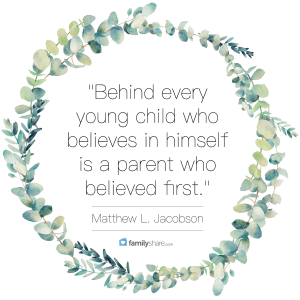Hi Families,
One thing we do as parents is encourage our child when we see them have a go and try new things, but are our words helping our child at all?
Today’s article looks at how powerful encouraging words can be, especially when used to benefit and support our child.
Happy reading,
Ms Jodie
How to encourage a child
By M. Grose
Of all the tools a parent can use, encouragement has got to be one of the most influential.
It derives from the French term coure’, meaning ‘to give heart’.
Encouragement takes many forms, such as:
- cheering a friend on at the end of a fun run
- boosting a family member when they’re having a bad day
- putting your arms around your teenager when they’re disappointed with exam results
- lighting up your face when a young child begins to walk
These are all instinctive, spur of the moment encouraging acts that everyone can relate to.
But how do you give heart to a child or teen who really needs it. You know when they’re really struggling.
It’s often hardest to encourage kids who need it the most.
These seven invaluable tips will make sure that your encouragement hits the mark and has a real impact on those (your child, a family member, or friend) who receive it.
1. Keep it real
There’s a recent trend to heap praise on kids for simply standing and drawing breath! We do kids a disservice when our praise becomes like a nervous tic!
We don’t help kids when we praise the basics of life. It’s meaningless.
Make sure your encouragement is meaningful. Give it when kids really need it – when they’re self-belief is lagging; when they think they can’t succeed; when they’ve lost a game for the umpteenth time in a row.
One way to keep it real is to be specific and descriptive with your language. “That was brilliant the way you did your homework straight after school. I can see you’re really thinking about it. Keep up the good efforts.”
2. Choose the right time
Timing is everything with communication. And yes, encouragement is a form of communication, albeit a very significant form.
Wait until an angry child has calmed down before you offer your encouragement. Help them calm down. Cuddle them if you can. The same goes with an angry teen, but maybe hold off on the cuddles. Then again, maybe not.
It’s pointless encouraging kids when their emotions are high. They won’t take your messages on board. Wait until their shoulders slump, which is a sign that they’re ready to listen.
3. Focus on ICE
You’ve probably noticed I’ve avoided (mostly) using the term ‘praise’. That’s because praise and encouragement are diametrically different. Praise focuses on the results (good marks, a big score, winning a game) of what a child does, and encouragement focuses on the process.
That’s a big difference. Rather than praise the results, which keeps kids reliant on the approval of others for their self-esteem, focus on these 3 processes:
Improvement: “You’re getting better at….”
Contribution: “Yep, you’re becoming a valuable member of the team.”
Effort: “Yowsers! If you try any harder, you’ll burst a fupher valve.”
The theory goes something like this: Focus on the processes (encouragement) and the results will invariably come.
4. Say it like you mean it.
Here’s a little trick you can try.
Say the following with your palms out, facing down, “Wow! That was such a good effort!”
How did you go? My guess is you sounded a little flat. Unenthusiastic!
Now offer the same words of encouragement with your palms out, facing upwards.
Notice any difference? If not, repeat the process.
Hopefully, you were more animated with your palms up.
My point? You can say “Well done, you!” all you like but the real encouragement is offered by your facial expression and body language.
Get animated when you encourage so the message sinks in.
5. Add some touch for emphasis
Parents of neuro-diverse children will know that a gentle touch on their child’s arm while they talk, dramatically increases the chance of the message being taken on board.
The same principle applies with encouragement delivered to any child or teen.
Touch amplifies the message, so don’t be afraid to touch your child while offering your gems of encouragement.
NB: The above only applies if your child feels comfortable with this type of physical contact.
6. No buts
There’s nothing like an encouraging comment delivered by a parent with a caveat to burst a child’s bubble.
“You tried really hard at school this year…but imagine what you could have achieved if you were more consistent with your homework!”
Yowsers! That “well done …..but” killed the mood and the effect!
Let the encouragement do its thing and save the but’s and the accompanying messages for another time.
7. Keep it short
Don’t rave. Deliver your encouraging message…with enthusiasm…like you really mean it because you should….with not buts.
And move on.
A final word….or two
Everyone needs encouragement. No one is immune from experiencing disappointment or struggle to succeed.
Everyone needs an injection of genuine hope and belief from a friend or family member.
That’s why encouragement is one of the most important tools in your parenting toolbox.
It’s a genuine life skill that you can pass on to your kids by being encouraging yourself.
It also becomes part of your family culture. Have a go!




